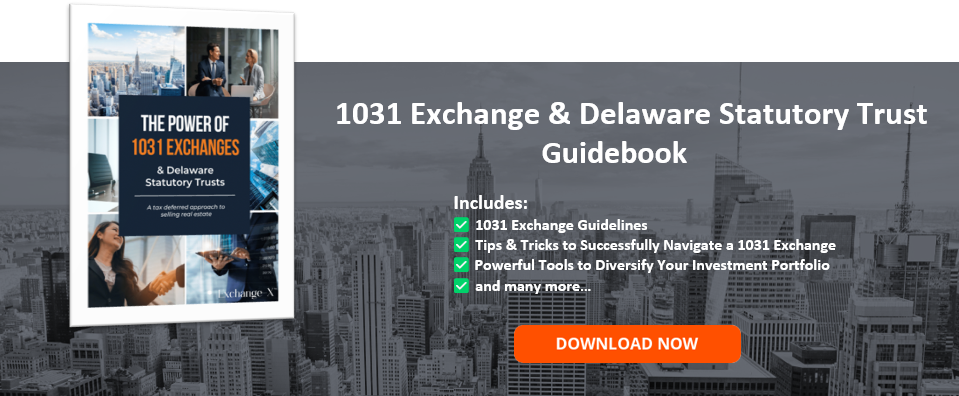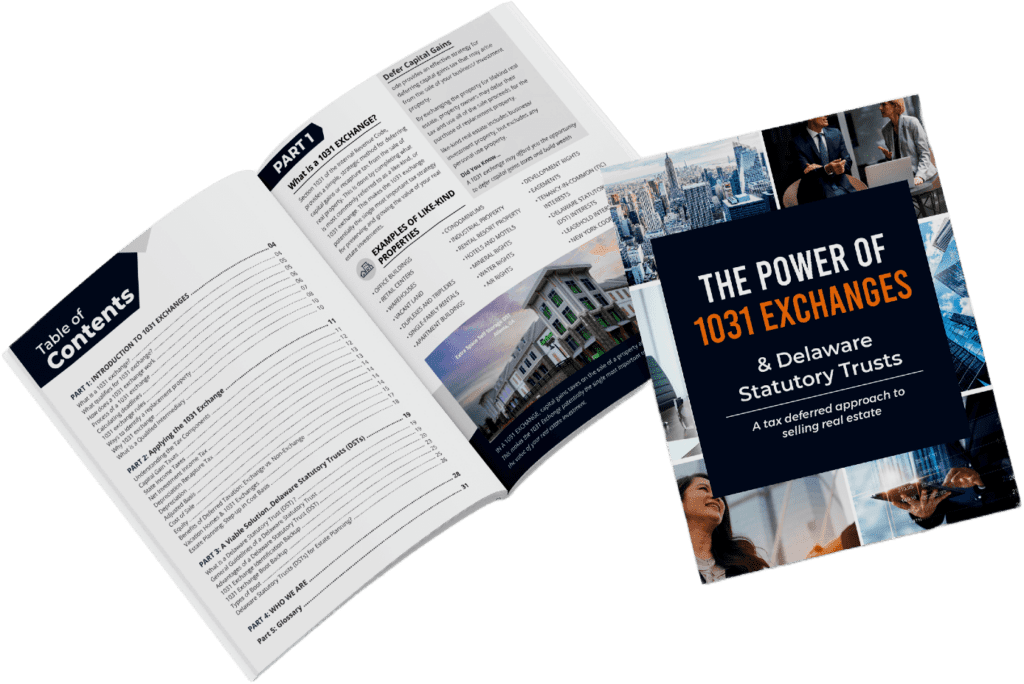A 1031 exchange is one of the most powerful tools available to real estate investors. However, there is often confusion around what qualifies for a 1031 exchange, especially when it comes to the “like-kind” property requirement.
In this article, we dig into the “like-kind” requirement and look at:
- What does “like-kind” mean?
- Properties that qualify for a 1031 exchange
- Properties that do not qualify for a 1031 exchange
What Does “Like-Kind” Mean?
The “like-kind” requirement in a 1031 exchange simply means that the investor must exchange one form of real property for another. This could include transactions like selling an apartment complex to purchase a warehouse or selling a retail center to purchase an office building.
Many people believe this requirement means you are limited to exactly the same type of property, such as selling an office building to buy another office building, but that is not the case. As long as the properties in the transaction are used for an investment purpose or for the purpose of a business, there’s a good chance they will qualify under the “like-kind” requirement.
Properties that Qualify for a 1031 Exchange

If you are a real estate investor, you will be happy to know that the list of qualifying properties is extensive and includes most common property types used for investment purposes.
Commercial Properties
Nearly all forms of commercial property are included under the “like-kind” provision of a 1031 exchange. As long as the building exists and it is being purchased for an investment or business purpose there’s a high likelihood that it will qualify.
The most common types of properties in this category are:
- Office
- Retail
- Industrial
- Hotel
- Self-Storage
- Medical
- Marina
- Golf Course
- Resorts
- Special Purpose
- Religious
- Government
Residential Properties
As with commercial properties, nearly every form of residential property qualifies for a 1031 exchange. The major exception to this is your personal home, which does not qualify.
The most common properties in this category are:
- Single family rentals
- Duplexes and triplexes
- Apartment complexes
- Condos
- Manufactured Housing
- Assisted Living Facilities
Unimproved Properties
While improved properties are great, another asset that qualifies for 1031 exchange is unimproved properties. Unimproved property simply means no major development has taken place on the land. Under the “like-kind” provision, you could sell improved property to buy unimproved property, or vice versa.
The most common properties in this category are:
- Raw land
- Vacant lots
- Agricultural
- Farms and ranches
Rights, Easements and Interests
Other, more obscure forms of real property ownership that qualify for a 1031 exchange are rights, easements and interests.
The most common properties in this category are:
- Delaware Statutory Trust (DST)
- Tenancy in Common (TIC)
- Land easements
- Leasehold (30-year or more)
- Mineral rights
- Oil & Gas rights
- Air rights
- Water rights
- Development rights
- New York cooperatives
Although not technically physical property in most cases, these rights have been deemed acceptable for a like-kind exchange because they represent an interest in real property and could be sold at a gain.
Easements are another form of right that gives permission to cross someone else’s land for a specific purpose. Many easements involve the right to ingress and egress, while others involve utility or pipeline easements.
Interests also include tenancy-in-common, leasehold and Delaware Statutory Trust interest, as well as New York cooperatives. These interests can be traded for other forms of real property in a 1031 exchange, with certain caveats that go beyond the scope of this article.
While all these forms of ownership do qualify for 1031 exchange, they often follow stricter guidelines than the more common forms of ownership. We highly recommend doing your own research and consulting with an expert if you are considering a 1031 exchange for your right, easement or interest.
Properties that Do Not Qualify for a 1031 Exchange
Although the list of qualifying properties is long and includes the most common types of real property that you are likely to run into, there are a few forms of ownership that do not qualify under the “like-kind” requirement.
Examples of property that does not qualify for a 1031 exchange include:
- Real Estate Investment Trusts (REIT)
- Personal residence
- Residential fix and flip projects
- Ground-up developments
- Stocks and bonds
- Partnership interests
- Foreign property exchanged for U.S. property
Luckily this list is much shorter than the list of properties that do qualify. The list of “like-kind” property is constantly being reevaluated by law makers. Exchangers should always engage with a licensed CPA and Qualified Intermediary for the latest “like-kind” qualifications.
Conclusion
We hope this article gave you a thorough understanding of what qualifies under the “like-kind” provision of a 1031 exchange. What seems like it could be a restrictive provision at first is actually extremely flexible and allows investors the ability to successfully exchange the most common forms of real property ownership.
Our team at Exchange-X has helped our clients navigate numerous 1031 exchanges, and we would be happy to assist you as well. If you are ready to start a 1031 exchange, or have additional questions about how one might work for your specific situation, contact us today or schedule a consultation with one of our experts.
Join Exchange-X! Click the link above to create an account now and be the first to know about upcoming opportunities.
Download your free copy of “The Power of 1031 Exchanges and Delaware Statutory Trusts (DSTs)” to learn more about how Delaware Statutory Trusts (DST) can complement your portfolio.
Full Disclaimer Copyright 2023 Exchange-X, LLC. All rights reserved.
The contents of this communication: (i) do not constitute an offer of securities or a solicitation of an offer to buy securities, (ii) offers can be made only by the confidential Private Placement Memorandum (the “PPM”) which is available upon request, (iii) do not and cannot replace the PPM and is qualified in its entirety by the PPM, and (iv) may not be relied upon in making an investment decision related to any investment offering by the respective issuer, or any affiliate, or partner thereof (“Issuer”). All potential investors must read the PPM and no person may invest without acknowledging receipt and complete review of the PPM. With respect to the “targeted” goals and performance levels outlined herein, these do not constitute a promise of performance, nor is there any assurance that the investment objectives of any program will be attained. These “targeted” factors are based upon reasonable assumptions more fully outlined in the Offering Documents/ PPM. Consult the PPM for investment conditions, risk factors, minimum requirements, fees and expenses and other pertinent information with respect to any investment. These investment opportunities have not been registered under the Securities Act of 1933 and are being offered pursuant to an exemption therefrom and from applicable state securities laws. Past performance are no guarantee of future results. All information is subject to change. You should always consult a tax professional prior to investing. Investment offerings and investment decisions may only be made on the basis of a confidential private placement memorandum issued by Issuer, or one of its partner/issuers. Issuer does not warrant the accuracy or completeness of the information contained herein. Thank you for your cooperation. Securities offered through Emerson Equity, LLC Member: FINRA, SIPC (CRD#: 130032/SEC#: 801-71293,8-66296). Only available in states where Emerson Equity, LLC is registered. Emerson Equity, LLC is not affiliated with any other entities identified in this communication.
For more information, read our Disclosures & Disclaimers and Terms of Service.
1031 Risk Disclosure:
- There is no guarantee that any strategy will be successful or achieve investment objectives;
- Potential for property value loss – All real estate investments have the potential to lose value during the life of the investments;
- Change of tax status – The income stream and depreciation schedule for any investment property may affect the property owner’s income bracket and/or tax status. An unfavorable tax ruling may cancel deferral of capital gains and result in immediate tax liabilities;
- Potential for foreclosure – All financed real estate investments have potential for foreclosure;
- Illiquidity – Because 1031 exchanges are commonly offered through private placement offerings and are illiquid securities. There is no secondary market for these investments;
- Reduction or Elimination of Monthly Cash Flow Distributions – Like any investment in real estate, if a property unexpectedly loses tenants or sustains substantial damage, there is potential for suspension of cash flow distributions;
Impact of fees/expenses – Costs associated with the transaction may impact investors’ returns and may outweigh the tax benefits.



